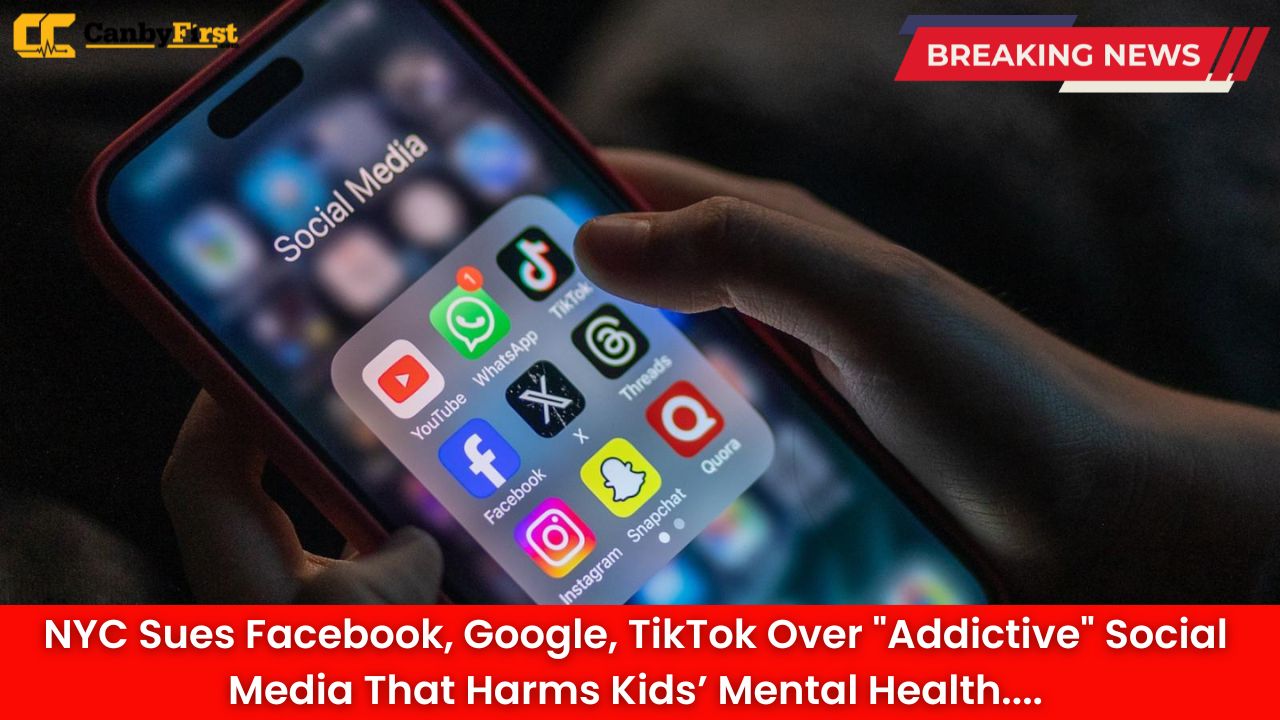New York, US: New York City has launched a landmark lawsuit against technology giants Facebook, Google, and TikTok, accusing them of knowingly designing addictive social media platforms that harm children’s mental health. The move marks one of the most aggressive legal challenges yet by a major US city against the social media industry’s influence on young users.
A First-of-Its-Kind Lawsuit
City officials filed the lawsuit in state court, alleging that the major platforms, including Meta’s Facebook and Instagram, Google’s YouTube, and ByteDance’s TikTok, have deliberately created features that keep children glued to their screens. According to the complaint, these companies exploit psychological vulnerabilities in minors, contributing to rising rates of anxiety, depression, and other mental health issues among children and teenagers.
The legal action seeks financial damages and reforms to the companies’ algorithms and design practices. Mayor Eric Adams said the lawsuit represents “a critical stand for the wellbeing of our children,” adding that “profit cannot come before public health.”
Also Read
Mounting Evidence of Online Harm
The filing comes amid growing national concerns about how social media impacts youth. Health experts and advocacy organizations have long warned that platforms optimize their algorithms to reward constant engagement, pushing kids toward harmful content or endless scrolling.
Studies and reports cited by the lawsuit claim that these platforms play a significant role in the mental health crisis facing young people, with spikes in depression, loneliness, and body image issues. Among the most concerning allegations are claims that companies intentionally deploy “intermittent reward systems” — the same psychological tactic used in gambling — to keep users logging back in.
City lawyers said the defendants have the technology and awareness to address these harms but have chosen profit over responsibility. “They engineered systems to maximize attention, regardless of psychological damage,” the complaint stated.
Tech Giants Respond
Though none of the companies immediately commented directly on the lawsuit, past statements from Meta, Google, and TikTok have touted their efforts to implement parental controls, age restrictions, and screen time tools. They have also defended their platforms as spaces for creativity, learning, and community building for young users.
Industry insiders suggest the companies will likely argue that parental supervision and user responsibility play a role in managing online behavior — not solely corporate design choices. Some experts anticipate a lengthy legal battle, reminiscent of Big Tobacco lawsuits in the 1990s that reshaped public health accountability.
Local Governments Join the Fight
New York City’s lawsuit follows similar legal actions filed by other states and municipalities across the US. More than 40 states have sued Meta over alleged youth mental health harms, while several school districts have launched their own cases seeking compensation for rising counseling costs and crisis services tied to social media addiction.
“This is part of a growing movement to hold social media companies to the same accountability standards as other harmful industries,” said a spokesperson for the city’s legal department. “Our aim isn’t just to punish — it’s to protect.”
City officials also announced plans to educate families about responsible digital use, increase mental health resources in schools, and support technology literacy programs.
The Cost to the City
According to the city’s complaint, the effects of youth social media addiction have placed heavy burdens on public institutions. New York’s Department of Education reports increasing demand for mental health counseling and crisis intervention linked to social media use. Emergency departments have also seen a rise in self-harm and anxiety cases among teens, which the city says correlate with online exposure.
“These companies target children with tactics that exploit vulnerability,” said Dr. Maria Lopez, a psychiatrist with the city’s health department. “We’re seeing more kids with diminished self-worth, disrupted sleep patterns, and social withdrawal — all symptoms stemming from digital dependency.”
What the City Hopes to Achieve
Beyond financial penalties, New York’s lawsuit seeks to force transparency from tech companies regarding their algorithms, internal research, and design practices. City attorneys are calling for stricter limits on addictive features, more rigorous age verification, and greater parental control tools.
One proposed outcome would require platforms to modify their engagement metrics and disable autoplay features for users under 18. Another demand pushes for public disclosure of how recommendation algorithms operate — a step the tech industry has largely resisted.
“The goal isn’t to shut down innovation,” said the city’s chief legal counsel. “It’s to make sure innovation isn’t destroying a generation’s mental health.”
National Implications
Legal scholars say the outcome of New York’s lawsuit could set major precedent for how courts deal with digital products and public health claims. If successful, it could force a wave of similar suits by other cities and states seeking damages for the societal costs of youth online addiction.
Some analysts predict the tech industry will rally behind a united defense, warning that overregulation could stifle innovation and freedom of expression. Others argue this lawsuit could prompt long-overdue reforms in how platforms design for safety and wellbeing.
Growing Public Pressure
Public sentiment appears to be shifting toward stronger government action against social media companies. Parents, educators, and mental health advocates have increasingly called for new digital safety laws to protect minors.
Many argue that the same energy used to regulate food safety and tobacco advertising should apply to digital platforms. “We’ve regulated everything else that threatens public health — why should social media be any different?” said one child psychologist affiliated with the city’s youth programs.
Meanwhile, several members of Congress have expressed support for tighter regulation, including rules around data privacy, algorithm transparency, and age-based usage caps.
What Comes Next
The lawsuit is expected to move forward in the coming months, potentially dragging the world’s biggest tech firms into a courtroom showdown over their responsibility to users under 18. While the timeline remains uncertain, city officials say they’re prepared for a prolonged legal battle.
If New York prevails, the judgment could reshape how social media companies design, market, and operate their products — much like past rulings forced changes in the tobacco, alcohol, and pharmaceutical industries.
For now, the case stands as a powerful signal: America’s largest city has decided that enough is enough.
FAQs
1. Why is New York City suing social media companies?
NYC claims Facebook, Google, and TikTok intentionally designed addictive features that harm children’s mental health and increase psychological dependency.
2. Which platforms are included in the lawsuit?
The lawsuit targets Meta’s Facebook and Instagram, Google’s YouTube, and ByteDance’s TikTok.
3. What does the city want from the case?
New York seeks damages and court-ordered changes to how these companies design and operate their platforms, particularly regarding children’s safety.
4. How could this affect social media users?
If the lawsuit succeeds, platforms may face new regulations, stricter parental controls, and limits on algorithmic engagement for minors.
5. Has any other city or state taken similar action?
Yes, over 40 states and several school districts have filed comparable suits accusing social media companies of harming young users’ mental health.












